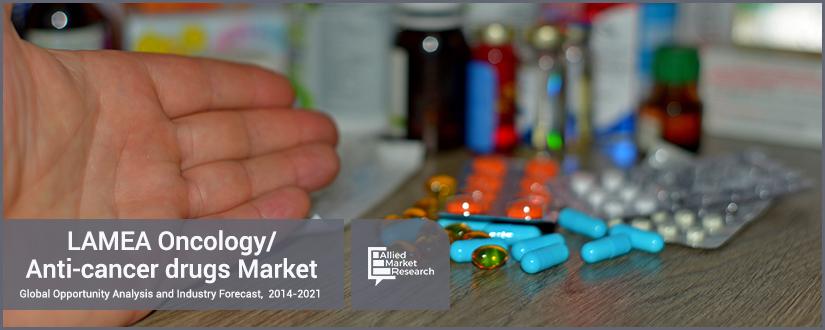LAMEA Oncology/Anti-cancer Drugs Market Overview
LAMEA Oncology/Anti-cancer Drugs Market is expected to reach $17,072.2 million by 2021, registering a CAGR of 8.6% during the forecast period 2015 - 2021. Oncology drugs are used for the treatment or management of the various cancer types. It eventually helps improve the quality of life for such patients and extends their chances and duration of survival. The biological drugs for oncological therapeutics are based on monoclonal antibodies (mAbs). They are expected to emerge as the most preferred option for treating various cancer types, especially blood cancer (leukaemia). This is because of the observed improvement in patient outcomes and low risks of side effects on the patient’s overall health and wellness.
The rise in incidence and prevalence of various cancer types, new cancer treatments, and the growing importance of biological and targeted drug therapies are certain factors that drive the market growth of LAMEA oncology/anti-cancer drugs at present. In addition, an increase in demand for anti-cancer drugs for the treatment of ageing population, the hike in government funding, and improved post-treatment results for advanced therapeutic modalities are the major factors that boost the market growth. However, the high costs associated with new drug development procedures, coupled with the threat of failure in deriving successful results, and the adverse effects associated with anti-cancer drugs therapies are expected to restrain the growth of the LAMEA market. The high costs incurred to develop anti-drugs leads to lofty pricing structures and restricts the accessibility for low to medium income population. This is a major challenge that is expected to further impede the growth performance of anti-cancer drugs in LAMEA region. However, a focused attempt to commercialize the advanced oncology therapeutics, such as targeted therapies and immunotherapies (biologic therapies), would reduce the negative influence of restraints and fuel the market growth.
Segment Overview
The LAMEA oncology drugs market is segmented into therapeutic modalities, types of cancer, and countries. The therapeutic modalities segment is further categorized into chemotherapy, targeted therapy, immunotherapy (biologic therapy), and hormonal therapy. Patent expiration of the blockbuster anti-cancer drugs such as Herceptin (Patent Expiration: EU-2014; US-2019), Erbitux (Patent Expiration: EU-2014; US-2016), Rituxan (Patent Expiration: EU-2013; US-2018), and Avastin (Patent Expiration: EU-2018; US-2019), is expected to boost the growth scenario for the cancer biosimilars market by 2021. The biological therapy is observed to be the fastest growing segment at a CAGR of 12.2%, throughout the analysis period, because of its high efficacy and target-specific action. Moreover, the blood cancer drugs market was the largest revenue generating application segment in 2015. This is majorly due to the high costs of these drugs (immunotherapies) and its widespread application for the treatment of blood cancer, which apparently was the cancer type that claimed maximum patient population in the oncological segment.
Based on countries, the LAMEA anti-cancer drugs market is segmented for study into nine countries, namely Brazil, Argentina, Nigeria, South Africa, Iraq, Iran, Algeria, Saudi Arabia, and Egypt. Out of these, Brazil dominates the LAMEA oncology market closely followed by Argentina. This is due to the rise in incidences of cancer, high per capita expenditure, and a higher gross national income (GNI) of Brazil. In addition, LAMEA market is poised to grow at a promising CAGR of 8.6% during the forecast period. This high growth rate is majorly attributed to the increasing awareness among consumers towards the advanced therapies, such as immunotherapy, and an increase in per capita healthcare spending.
The list of leading companies profiled in the report include Amgen Inc., AstraZeneca Plc., Roche Diagnostics, GlaxoSmithKline PLC, Merck & Co., Novartis AG, AbbVie Inc. Sanofi, EIMC United Pharmaceuticals (EUP), and Actavis plc.
Key Benefits for Stakeholders
The report provides a quantitative analysis of the current market and estimations through 2014-2021 that assists in the identification of the prevalent market opportunities.
The report helps in understanding the strategies adopted by various companies for gaining increased market share in the LAMEA anti-cancer drugs market.
The report provides a comprehensive analysis of factors that drive and restrict the growth of the LAMEA oncology drugs market.
Market conditions of anti-cancer drugs market across LAMEA region are comprehensively analyzed.
Competitive intelligence highlights the business practices followed by leading market players across various geographies.
SWOT analysis enables to study the internal environment of the leading companies for strategy formulation.
LAMEA Oncology/Anti-cancer drugs Market Report Highlights
| Aspects | Details |
| By THERAPEUTIC MODALITIES |
|
| By CANCER TYPES |
|
| By COUNTRIES |
|
| Key Market Players | AbbVie Inc., Actavis plc, Novartis AG, Roche Diagnostics, Amgen Inc., Merck & Company, GlaxoSmithKline PLC, Sanofi, AstraZeneca PLC., EIMC United Pharmaceuticals (EUP) |
Loading Table Of Content...




